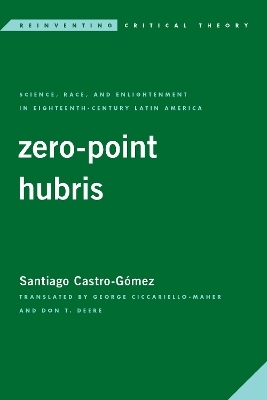
Zero-Point Hubris
Rowman & Littlefield International (Verlag)
978-1-78661-377-6 (ISBN)
Santiago Castro-Gómez is professor of philosophy at the University of Santo Tomás and the University Javeriana in Bogotá, Colombia. He has taught as visiting professor at Duke University, Pittsburgh University, and the University of Frankfurt. His first book, Critique of Latin American Reason is now a classic text of Latin American philosophy. His many other publications include La hybris del punto cero, Tejidos oníricos, History of Governmentality, Volumes I & II, and Revolutions without Subject. George Ciccariello-Maher is associate professor of politics and global studies at Drexel University. Don T. Deere is visiting assistant professor of philosophy at Loyola Marymount University.
Translator’s Introduction / 1. Places of Enlightenment: Colonial Discourse and Geopolitics of Knowledge in the Century of Enlightenment / 2. Purus ab omnia macula sanguinis: The colonial imaginary of whiteness in New Granada / 3. Imperial Biopolitics: Health and sickness in the framework of Bourbonic reforms / 4. Illegitimate Knowledges: The Enlightenment as mechanism of epistemic expropriation / 5. Striated Spaces: Geography, territorial politics, and population control / Epilogue / Appendix (to the 2nd edition) / Bibliography / Index
| Erscheinungsdatum | 16.12.2020 |
|---|---|
| Übersetzer | George Ciccariello-Maher, Don T. Deere |
| Verlagsort | London |
| Sprache | englisch |
| Maße | 154 x 219 mm |
| Gewicht | 535 g |
| Themenwelt | Geschichte ► Teilgebiete der Geschichte ► Wirtschaftsgeschichte |
| Geisteswissenschaften ► Philosophie | |
| Sozialwissenschaften | |
| ISBN-10 | 1-78661-377-8 / 1786613778 |
| ISBN-13 | 978-1-78661-377-6 / 9781786613776 |
| Zustand | Neuware |
| Haben Sie eine Frage zum Produkt? |
aus dem Bereich


